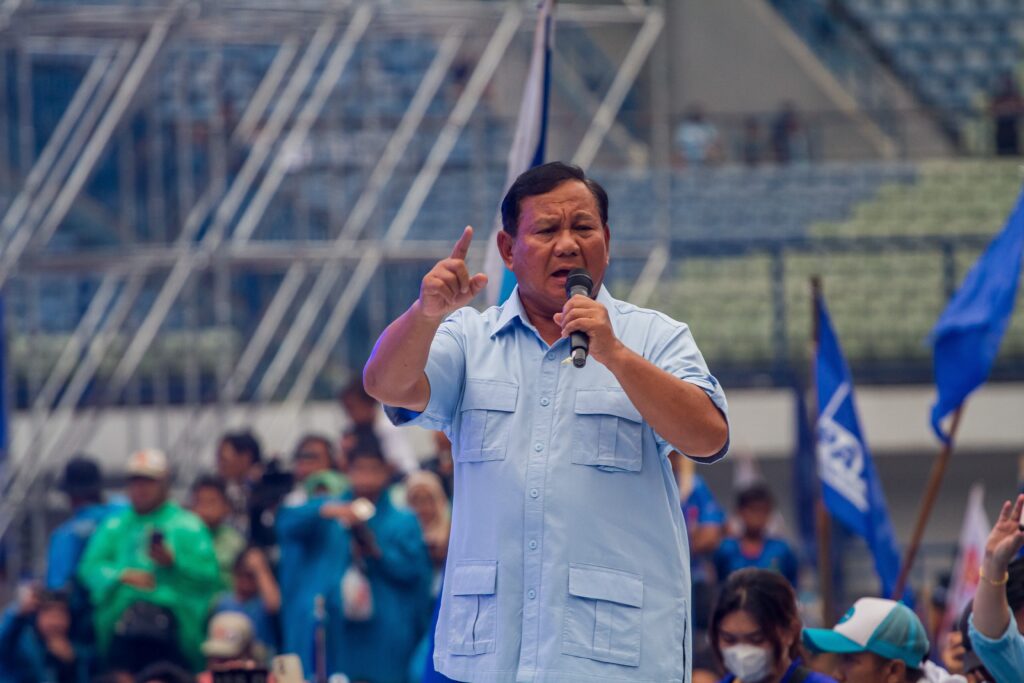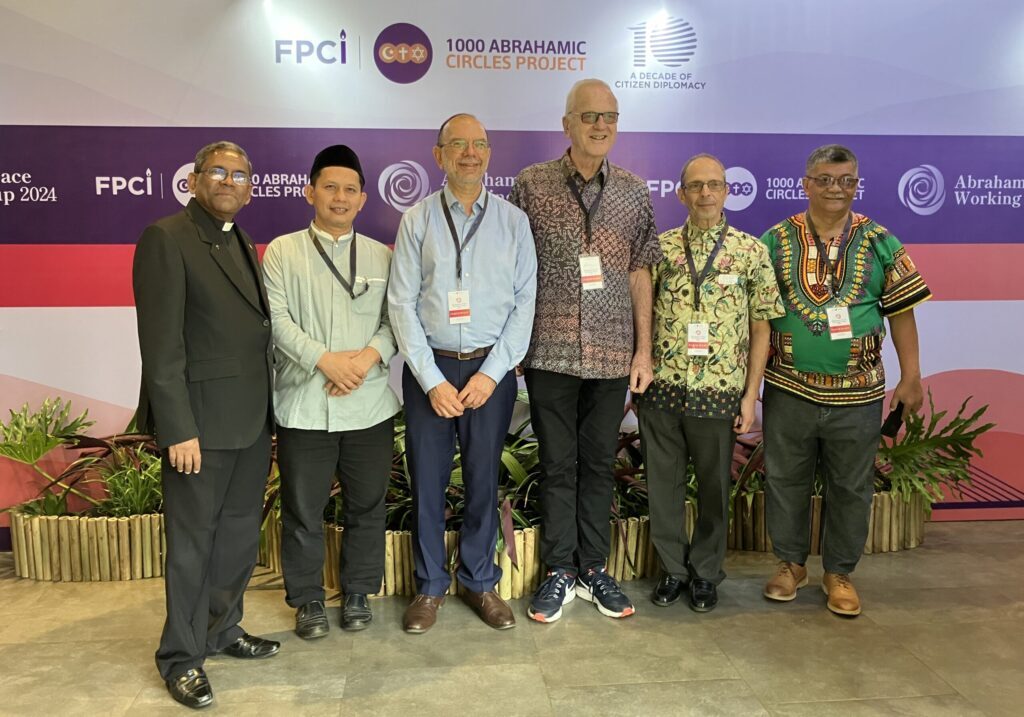Australia/Israel Review
President Prabowo: Strongman or responsible statesman?
Mar 1, 2024 | Zachary Abuza

The first-round election victory of Prabowo Subianto on February 15 returns a potential strongman, with close personal ties to Suharto’s “New Order” regime (1966-1998), to the helm of Indonesia. It was the fourth presidential campaign for the 72-year-old former general, and the culmination of a 25-year-long campaign to rehabilitate his image.
There are many reasons to be concerned about his presidency, which will have important consequences for democracy and human rights at home, and Indonesian foreign policy in the region and further afield.
Prabowo has an appalling human rights record. In the 1990s, as the head of Kopassus, Indonesia’s special forces, Prabowo stopped at nothing to defeat FRETELIN, the East Timorese secessionist rebel group which won independence through a UN-sponsored referendum in 1999.
Prisoners were routinely tortured, people disappeared, and civilians targeted. But as Suharto’s son-in-law, he was largely untouchable.
In 1998, as the head of Kostrad, the strategic reserve force, Prabowo was implicated in fomenting riots in Jakarta, in an attempt to scapegoat the Chinese community in the midst of the Asian Economic Crisis. He was thrown out of the military for the abduction of pro-democracy activists, a charge that he denies.
After a period of exile in Jordan, he failed to gain the nomination of the Golkar party, the New Order-era political machine, in the 2004 election. He then established the Gerindra party as his own political vehicle.
Prabowo narrowly lost to outgoing President Joko Widodo, commonly referred to as Jokowi, in both 2014 and 2018. In both cases, he ran as a strongman, promising a return to New Order-style governance. He campaigned in uniform, often appearing in packed stadiums on a white stallion.
Ominously, after losing in 2019, he claimed voter fraud and encouraged his supporters, which included many Islamist parties, to take to the streets to challenge the election results. Several people were killed.
President Widodo brought Prabowo into his cabinet as Minister of Defence, where he had a mixed record. On the one hand, he was able to get the Government to raise the defence budget to support a military modernisation program. That included deals to procure 42 Rafael jet fighters from France and F-18s from the United States. But several key acquisition programs failed, including an attempt to procure 12 used French Mirage jets from Qatar, and being potentially dropped from a joint fighter production program with South Korea for non-payment.
Prabowo continued the Bela Negara [“Defence of the Nation”] policies established by his predecessor, Ryamizard Ryacudu, which identified secessionism, drugs and LGBTQI+ rights as the greatest threats to national security. The military clawed back many of the civilian powers that it ceded in 1998-2000, involving itself in food security, counterterrorism, and the training of militias. This culminated in a 2023 law that allowed uniformed military personnel to concurrently serve in a civilian capacity; a return of Suharto’s “dual function” policy.
But Prabowo also used his tenure as Minister of Defence to burnish his statesman credentials. He waded into the Russian invasion of Ukraine with a factually challenged peace proposal that was ridiculed. But he also used his time to travel to the United States after being banned from entering the country for over 20 years for alleged human rights violations.
This election campaign, Prabowo had a total image makeover, campaigning as a grandfather figure, adroitly using social media, complete with dances and cat videos. With 56% of the population under the age of 40, few remembered life under Suharto’s dictatorship. The cynical selection of Gibran Rakabuming Raka, the 36-year-old son of the term-limited President Jokowi, as his vice president conveyed an image of mentorship.
Democracy under Threat?
There are reasons to fear democratic reversals. Freedom of the press weakened under Jokowi, and independent agencies such as the Counter-Corruption Commission lost significant autonomy. Those trends may continue.
The conflict in restless Papua intensified in the past few years, as a new generation of charismatic and media-savvy militants emerged. They stepped up attacks on the security forces and the mining sector, which prompted reprisals escalating the cycle of violence. The Government frequently closed the province to foreign media and imposed internet blackouts. It’s hard to see Prabowo searching for a political solution or addressing the core grievances of Papuans.
Despite the fact that Prabowo’s political coalition includes a number of Islamist parties, Prabowo is mercurial. Personally, he is a secular nationalist. But he has always pandered to the Islamists and toyed with identity politics – though to a much lesser extent than his presidential rival Anies Baswedan. Desperate for a parliamentary majority, Prabowo will likely try to win over Anies’ Islamist partners.
Yet, at the same time, he is likely to give the security forces the resources and authority to target the al-Qaeda-linked Jemaah Islamiyah and Jamaah Ansharut Daulah, the umbrella grouping of pro-Islamic State organisations.
It’s too early to declare his election means the end of Indonesia’s 25-year democratic experiment. Prabowo’s own party only won 13% of the seats in parliament. His coalition, at the time of writing, only had 42% of the seats, short of a governing majority. He won the election but does not enjoy Jokowi’s still very high approval ratings (76%). Indonesians have shown that they value their democracy, and Prabowo’s success came after downplaying his strongman image.
We still don’t know much about his incoming cabinet. And given the fact that he is not scheduled to be inaugurated until October, unless Parliament moves up the date, there’s a lot of horse trading that will likely take place before then.
The policy agenda that he campaigned on, both defence and social services, is likely to be thwarted by fiscal realities. The country has a 3% debt limit, and his promised school lunch and milk program would by itself be enough to drive that to around 5%.
Prabowo has targeted 7% economic growth, which will be impossible without more foreign investment. Like all Indonesian politicians, Probowo is a protectionist. Indonesia remains a hard place to do business, riddled with bureaucracy, coddled state-owned enterprises, and endemic corruption. Prabowo has no road map to address these realities.
Foreign Policy
So what does his presidency mean for Indonesia’s foreign policy?
He campaigned as the continuity candidate, but he’ll likely have a more active foreign policy than Jokowi, whose foreign policy focused on securing new export markets and foreign investment.
Those will also remain key concerns for Prabowo. Indonesia is expected to become the world’s sixth-largest economy by the turn of the decade, but remains a middle-income country with significant poverty.
Relations with China will remain key, as the largest trading partner, essential foreign investor and provider of critically-needed infrastructure development assistance. As the largest producer of nickel, Indonesia is expecting more investment from China, which dominates the electric vehicle market.
But Prabowo is likely to balance that with outreach to Japan, South Korea, Australia and the European Union.
Prabowo’s relationship with the United States is complicated, owing to his human rights record and the visa ban. But he offers the promise of major arms agreements, and controls three major sea lanes of communication. Like others in the region, he sees utility in the US military presence. And during his tenure as Defence Minister, bilateral exercises and engagements with the United States increased. Washington, though, is unrealistic in believing that Prabowo would be willing to stand up to Chinese pressure.
Under Prabowo, Indonesia should be expected to play a greater leadership role in the ASEAN bloc, a role that Jokowi abdicated. That could be important for the bloc’s cohesion. ASEAN flounders without strong Indonesian leadership.
But on a number of issues, Prabowo could be divisive. In the mould of a military strongman, he’ll unlikely change course on Myanmar, instead relying on ASEAN’s failed Five Point Consensus that continues to treat the Myanmar military as a legitimate actor that should be engaged.
Most importantly, Indonesia is unlikely to push back against Chinese assertiveness in the South China Sea. Rather than expand naval capabilities, Prabowo oversaw the build-up of bases and deployment of soldiers to Natuna Island. Economically reliant on China, Prabowo is unlikely to pursue any confrontational policies, even as Beijing engages in seismic research, conducts illegal fishing or launches coast guard patrols in Indonesia’s Exclusive Economic Zone.
Indonesia longs to have a greater role in international affairs. That is expected to continue in a Prabowo presidency, though previous Indonesian attempts have been unsuccessful.
Israel’s current war against Hamas in Gaza was an electoral issue, in as much as any foreign policy issue was. Each of the three presidential candidates was obsequious in their support for the Palestinians, as they sought to pander to voters in the largest Muslim country in the world. None offered more than knee-jerk criticism of Israel.
While Indonesia has had limited bureaucratic engagement with Israel, any move towards full diplomatic recognition would be impossible unless the Abraham Accord process resumes.
There has always been a concern about Prabowo’s temperament. Coupled with his authoritarian leanings, there’s plenty of reason to be concerned about Indonesia’s future.
But the jury is still out. There were similar concerns about the election of Ferdinand Marcos Jr. in 2022 in the Philippines. He, too, whitewashed his family’s authoritarian and kleptocratic history through social media that targeted the youth vote. Yet, to date, he has helped restore democratic institutions weakened under his predecessor, Rodrigo Duterte, and improved the alliance with the United States.
Prabowo’s past is concerning, but he appears to have mellowed over time. He has promised to govern on behalf of all Indonesians, and as the economy grows, he will have to be a responsible statesman if Indonesia is going to get the respect it feels it deserves.
Zachary Abuza PhD is a Professor at the National War College in Washington, DC, where he focuses on Southeast Asian politics and security. The views expressed here are the author’s alone and do not reflect the opinions of the National War College or the US Department of Defense.
Tags: Indonesia






